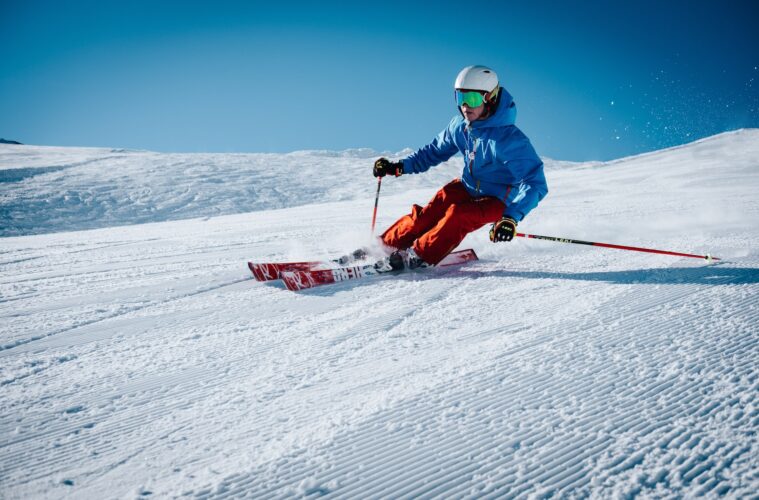Winter marks the return of Ski Season, and as Google searches for ‘ski holidays 2022’ have increased by 117% in the last month alone, it’s safe to say that skiing holidays are in demand as the new year draws closer. But with 1.5 million Brits heading on a ski trip every year, experts are urging holidaymakers to take precautions and fully prepare for their experience to avoid becoming one of the thousands likely to experience personal injury.
Like any other extreme sport, skiing comes with its risks, and concerning stats reveal that a third (33%) of winter holiday goers never check whether they’ve taken out the appropriate insurance for their activities. That’s why Jacqueline Busby, Head of Claims at personal injury specialists First4Lawyers has shared her expert insight outlining some of the more common ski injuries, and top tips on how to prevent them:
The most common skiing injuries to be aware of on your ski holidays:
Some of the most common ski injuries include: head injuries and concussion, brain injury, soft tissue and ACL damage, hand and thumb injuries and dislocated shoulders, Jacqueline adds:
“Skiing can be huge amounts of fun, as well as fantastic exercise, but it comes with risk. With the most common skiing injuries including head and brain injuries, it’s vital that care is taken on the slopes. These kinds of injuries can have catastrophic and life-changing effects on your life, so make sure you’re doing all you can to keep yourself safe. Even the less severe injuries, like fractures and dislocations, can stop you from enjoying your holiday.
“If you haven’t been skiing before, make sure you take the necessary precautions to return home with photos rather than injuries. And even if you’re an expert, it’s important to remember that accidents can happen to anyone so don’t get complacent. So make sure you’re being careful and doing what you can to keep others safe too.”
Jacqueline’s expert tips on how to prevent personal injury on the slopes:
Ski to your ability
Jacqueline says: “If it’s your first time skiing, don’t try to be too ambitious, take baby steps and ensure that you’re going at your own pace. Don’t compare yourself to experienced skiers, and concentrate on refining the basic skills first before you attempt any of the bigger slopes.
“If you try to rush through the training too quickly, you might end up missing some of the key health and safety information, and tips and tricks, that are ultimately in place to help keep you safe on your holiday.”
Spend time warming up your muscles
Jacqueline comments: “As with any exercise, it’s important to warm up your muscles. According to experts⁵, the warm up is the most important thing you need to do to prepare for your skiing session, as it improves circulation and makes the body more flexible, particularly in the colder weather conditions.
“Make sure your warm up incorporates moves that reach every part of the body, particularly focusing on the arms and legs that will feel most of the strain from activities such as skiing.”
Invest in the necessary protective equipment
Jacqueline advises: “Whilst ski-wear is often seen available on many fashion sites around this time of year, be sure to check that they meet the recommended requirements to keep you warm and safe during your skiing sessions, so looking in specialist stores is advisable.
“Most ski resorts will have protective equipment available to rent, but if you’re a regular skier, getting to know the brands and styles that work best for you, and investing in your own, might be a better option.”
Understand the signs
Jacqueline suggests: “Before your trip, you should spend some time revising the ski trail signs to ensure you fully understand them before hitting the slopes. Signs differ based on which country you visit, so make sure you read up on the specific symbols you’ll need to look out for based on where you’re visiting. The signs will often outline the difficulty of particular slopes, so knowing what to look out for based on your ability is crucial.”
Avoid alcohol and stay hydrated
Jacqueline says: “Whilst it may sound obvious to some, skiing whilst under the influence of alcohol increases the likelihood of experiencing an injury. Previous research from Direct Line⁶ showed that skiers are 43% more likely to be involved in a crash if they have consumed alcohol, yet millions admit to skiing under the influence.
“If you are consuming alcohol during your skiing holiday, ensure that you’ve fully sobered up before you head back to the slopes, to ensure you’re in full control and avoid any unnecessary injuries.”
Jacqueline adds: Jacqueline adds: “With some high-profile skiing accidents in recent years highlighting the need to take particular care, it’s important to be aware of the risks.
“One crucial aspect to be on top of is your insurance. Before you head off to the snow, make sure your insurance covers skiing accidents. The only thing worse than being injured on holiday is being injured and not having the correct insurance to get the treatment you need. Avoid being one of many who don’t check their cover and enjoy your holiday with peace of mind.
“It’s also important to remember that you may be able to make a compensation claim if your injury was someone else’s fault. You may be able to claim against your holiday operator, ski centre or instructor if their negligence led to you being hurt.”
To find out more about sporting injuries and to make a claim, visit: https://www.first4lawyers.com/personal-injury/accidents-abroad/sports-accidents/



